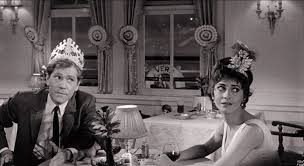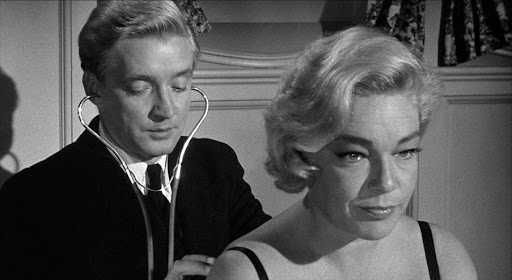




The cinema of Stanley Kramer is marked by movies that touched, directly or indirectly, matters of great social import and social justice.
Race and racism messages were carried in “The Defiant Ones” and “Guess Who’s Coming to Dinner.” The perils of the nuclear arms were laid out in the forlorn “On the Beach,” anti-science conservative no-nothingism sent-up in “Inherit the Wind” and World War II’s most important subtext — The Holocaust — informed “Judgement at Nuremberg,” “The Juggler” (which he produced) and perhaps his weakest “message” movie, 1965’s “Ship of Fools.”
An all-star melodrama in the “Grand Hotel/Airport” model, it’s a slow-moving disaster about a slow-moving disaster. The film is set in 1933. The “ship” in question is German, heading home to its newly-fascist German home port . And the characters, one by one, answer the question posed by a complacent German Jew (played by Heinz Rühmann) in their midst.
“Do you zink zis boat is a cross-section of ze German people?”
Yes it is.
Based on a Katherine Anne Porter best-seller, this sailing-into-fascism allegory is heavy-handed, even if you ignore the opening and closing remarks to the camera made by the canny dwarf passenger (Michael Dunn, most famous for his turn on TV’s “The Wild Wild West”).
“Oh I can just hear you saying, ‘What has all this to do with us?'” he chuckles to the viewer as the passengers disembark in Swastika-bedecked Deutschland. “Nothing.”
But audiences, who even-then needed reminding that the great sacrifice of World War II was worth it, that totalitarianism, racism and eugenics were evils to constantly be on guard against, ate it up. Kramer made many a movie contrived to make the viewer feel good about standing up, buying a ticket and being counted, that one was considering the issues tackled in that film in their daily and public lives.
No, you don’t tolerate, support or vote for racists, militarists, the willfully ignorant or the nationalist. Nazis are Nazis, Communists are Communists and human rights, like human life, aren’t just :liberal” values, they are to be supported and preached by one and all.
The message took priority over the narrative, in this case. But as soundstage-bound as this Oscar-nominated sea voyage was, as clumsily-unsubtle as it could be, there are riches in its sometimes tedious two and a half hours.
Vivien Leigh gives one last haughty, faded-rose turn as an aged American divorcee trying to pass for 46 and keep some dignity in her bitter loneliness.
Elizabeth Ashley, the last surviving member of the cast, is utterly captivating as an American artist trapped in a love-lust-hate relationship with leftist fellow artist George Segal. She dances the flamenco, flirts, fights and falls back into her beloved’s arms.
Oskar Werner, a draft-dodging WWII veteran, gives one of his best “conscience of a nation” performances as a ship’s doctor miserable about his lot in life and the country he must return to.
Simone Signoret (“Les Diaboliques”) underplays an addict who falls for the doctor.
For all his hamminess and showboating bluster, José Ferrer is never less than fascinating to watch as Rieber, a eugenics-preaching Nazi sympathizer, disturbing many with his anti-Semitism, but ardent in his pursuit of a golddigging German blonde (Christiane Schmidtmer), who dances with him and duets with him in German song.
And Dunn, deftly playing the self-aware conscience of the piece, delivers plain truths about who the inhumane hate — dwarves, Gypsies and Jews, etc. — and where that hate is headed.
“Fifty percent of the people who produced a Goethe, a Beethoven, and a Bach voted for Rieber’s party last week!
The narrative follows the unnamed passenger liner from Veracruz, where Lee Marvin’s failed baseball player turned coach was “trying to teach the greasers how to play ball.” Why he should be taking a slow boat to Germany is anybody’s guess.
The captain (Charles Korvin) is disappointed that his ship’s doctor (Werner) has abruptly announced this is his last voyage. The charming but racist purser (Werner Klemperer, most infamous for TV’s “Hogan’s Heroes”) won’t be quitting. Like the skipper, he’s a “Good German,” going along to get along. The captain denies admission to the captain’s dinner table to the lone dwarf on board and the Jewish “religious trinkets” salesman (Rühmann).
The young painters (Ashley and Segal) paint and bicker. The aged “Condesa” (Signoret) is an addict facing prison in Tenerife, another stop on the long voyage home, for her drug abuse.
For 26 days, Rieber (Ferrer), the ardent German Nationalist, has a captive audience for his sermons on all things grand and German.
The troupe of Spanish dancers returning home are headed by Pepe (the flamenco legend José Greco), who leads them in formal and informal dances all through the voyage. And after the dancing, he pimps out the women in his ensemble.
Characters discuss their worries, their ennui and their wants in promenades along the (soundstage) upper decks on in private in their staterooms. A lad is under the thumb of a stingy rich relative. A German couple let their English bulldog dine at the table with them. Some deny their bigotry. Some are in denial over it.
And when the ship stops in Cuba, it takes on some 600 Spanish laborers freshly-deported back to Spain. The deck and steerage are crowded with bodies which the purser sniffs over but whom the doctor treats and insists get hose-downs in lieu of baths.
There’s a riot on deck, a man overboard tragedy and a lot of roiled feelings, sexual and political, to fill the days and nights of this arduous voyage.
The scenes are all set-pieces, theatrical, exposition-packed conversations summing up political stances, personal failings, wants and desires. Very “Grand Hotel.” Very “Airport” or “Poseidon Adventure” without the adventure, very “Love Boat” without much love.
A few of the speeches sting and some of the performances resonate. But this ship lumbers along, not so much doomed as resigned to its fate.
We get “the message” Kramer & Co. are sending early enough. There’s just not enough other on-board drama that we’d care about to animate this parable at sea. For once, Kramer, who’d just given us the bloated farce “It’s a Mad, Mad, Mad World,” wears out his welcome and out patience with a picture that’s too pat, too obvious and entirely too long to stay afloat on its own.
Rating: unrated, violence, adult situations, some profanity
Cast: Vivien Leigh, Oskar Werner, Lee Marvin, Elizabeth Ashley, George Segal, Simone Signoret, Werner Klemperer, Christiane Schmidtmer, José Greco, Charles Korvin, Michael Dunn and José Ferrer
Credits: Directed by Stanley Kramer, based on the novel by Katherine Anne Porter. A Columbia Picture release on Roku TV, Amazon, etc.
Running time: 2:29

